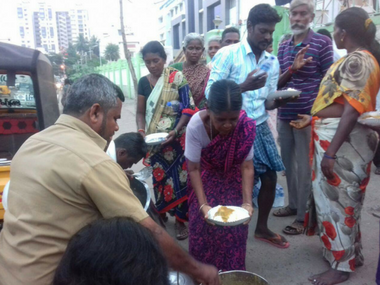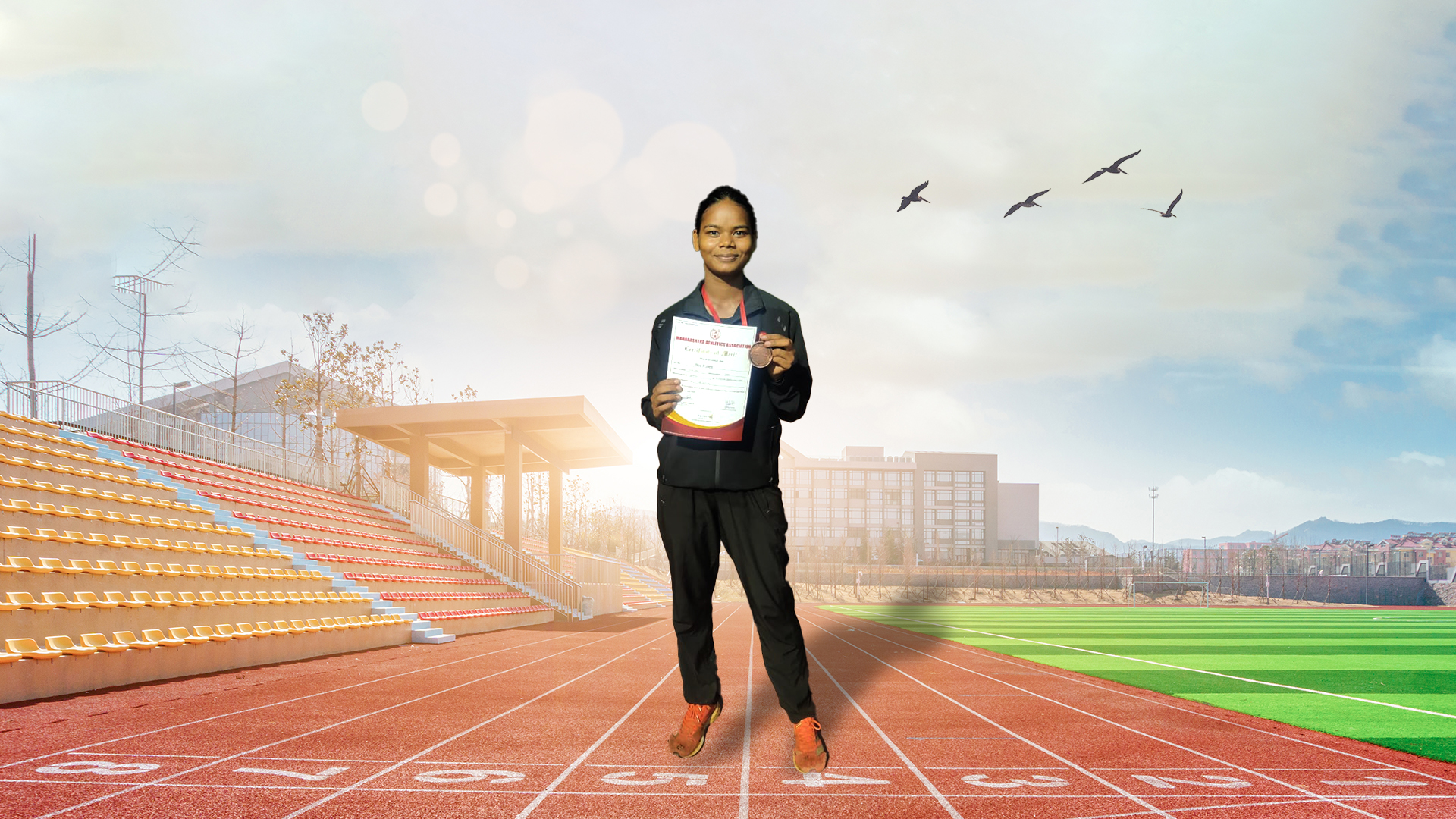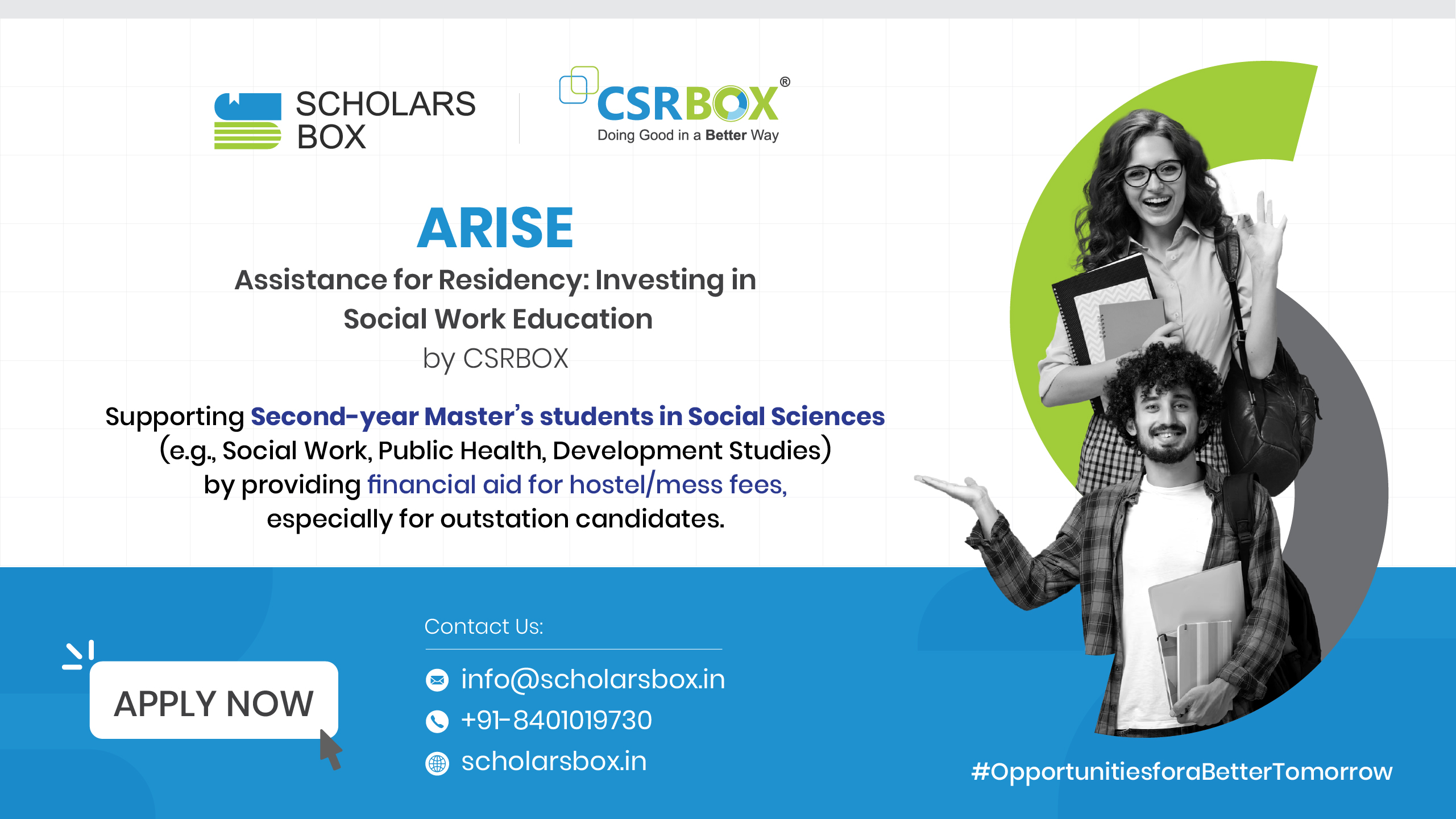Food distribution initiatives across India are helping citizens reduce wastage, feed hygienic meals to poor
By First Post
January 10, 2018

The good intention of helping the hungry get quality food exists across the country, however, the logistics of it can be confounding. And no one can relate to this better than Padmanaban Gopalan, a young activist and the founder of No Food Waste in Coimbatore.
At a wedding, a few years ago, Gopalan had begun to wonder about all the food that is wasted at such large scale events. The question disturbed him enough to want to do something about it. So he set up a Facebook page which said that he could be contacted if there was surplus food at an event and that he would collect and deliver it to the needy. His first call came the next morning and his initiative No Food Waste (NFW) was thus born.
Today, NFW has fed around 4,23,700 plus people and has saved 140 tons of food from going to waste. They are operating in multiple cities of Tamil Nadu, Andhra Pradesh, Kerala and Delhi NCR.
Padmanabhan says, “Our success will be when we shut down our service. At present, the Food Safety and Security Association of India (FSSAI) is helping us with our organised expansion plans.”
Encouraging such initiatives, the FSSAI hopes to go beyond its mandate of ensuring safe and standardised food. Doing its bit, the FSSAI has started a novel initiative of pooling fragmented individual and institutional efforts of retrieving, collecting and donating food to the needy with the launch of an online platform called Indian Food Sharing Alliance (IFSA). Intended at reducing food wastage that happens after due processing and at food service businesses in the country, the initiative will soon be piloted in Delhi.
Speaking at the launch of the Save Food, Share Food, Share Joy campaign at the recently concluded Tasting India Symposium in Delhi, Pawan Aggarwal, CEO of FSSAI said, “Our endeavour is to build an eco-system of food donors, recovery agencies, etc. and integrate all efforts,” he said. “In order to make the system transparent, the platform will have a geotagging provision by which people will be able to know where the food collected is distributed,” Aggarwal added.
With IFSA becoming a reality, FSSAI will also launch two campaigns to educate and create awareness about food donation. One campaign, Street Food Vendors Have a Heart, will be launched with the support of National Street Vendors Association (NSVI) which has assured that every street food vendor will donate every 10th meal for free to a needy person. The campaign will be initiated during the forthcoming National Street Food Festival in January 2018 in Delhi. In the second campaign – I Too Have a Heart – FSSAI plans to encourage food businesses including restaurants to donate 100 packets of food every month to IFSA.
Networking with restaurants is the model on which Feed On, the brainchild of Arjun Sawhney and Jessy Jindal, two students in the 11th grade at the Shri Ram School Moulsari in Gurgaon, is based on. Their venture collects and serves good quality restaurant food to those who need it. Each restaurant signs up to donate a specific number of meals. Volunteers pick up these meals and distribute it in slums or at designated places that have been identified by NGOs they have signed up to work with.
Arjun says, “Hunger is limitless but so are the avenues to help tackle it. Social media has helped expand the campaign and even automated the entire process.” Jessy adds that the idea is to serve good quality, fresh food that you and I would eat ourselves. “Keeping in mind sensibilities and health consciousness, we stick to serving vegetarian food," she says.
Since they first began, they have served over 13,500 meals, worked with 26 restaurants, over eight NGOs, and have 100 dedicated volunteers to help distribute food collected in Delhi, Gurgaon, Bangalore, Hyderabad and Mumbai. The number of restaurants are going up each day.
While these youngsters roped in restaurants to source food for the hungry, Rasoi on Wheels spearheaded by Atul Kapur, Manika Badhwar and Ashim Badhwar decided to go with a mobile kitchen that prepares hygienic food, which is packaged and can be bought for distribution at nominal prices. Atul Kapur says, “I believe in individual social responsibility. I personally found it a challenge in going through restaurant contributions and trying to identify what may be leftover food or which may have meat content. We found it better to be responsible for the cooking ourselves. The charity here is transparent.”
Their meals are wholesome, everyday combinations of rice, rotis, sabzis and gravies. They also offer varieties in the form of burgers, noodles and the other snack items. After all, who doesn’t appreciate variety in food items!
While these are some of the efforts where cooked food is concerned, there is also a need to look at the wastage that happens from the shelves of our stores. Working on food grains and packaged foods, The Indian Food Banking Network (IFBN) has 12 food banks across the country that distribute to people in need. “Products that are taken off shelves in retail stores generally still have a shelf life of 30-45 days which is enough of time to be collected and distributed to those who can use them,” explains Vandana Singh, CEO, Food Security Foundation of India (FSFI)-IFBN.
“Packaged food at warehouses especially, tends to be separated and discarded if they have just a month to go. A food bank acquires donated food products including grains and packaged food as well as funds for sponsored mid-day meals or snacks and makes it available to people who are hungry or lack nutritional food”.
What each of these organisations, private or governmental, offers citizens who want to make a difference, is the chance to be a part of it all – as volunteers, donors or even simply to spread the word on a great initiative.
Food distribution initiatives across India are helping citizens reduce wastage, feed hygienic meals to poor
The good intention of helping the hungry get quality food exists across the country, however, the logistics of it can be confounding. And no one can relate to this better than Padmanaban Gopalan, a young activist and the founder of No Food Waste in Coimbatore.
At a wedding, a few years ago, Gopalan had begun to wonder about all the food that is wasted at such large scale events. The question disturbed him enough to want to do something about it. So he set up a Facebook page which said that he could be contacted if there was surplus food at an event and that he would collect and deliver it to the needy. His first call came the next morning and his initiative No Food Waste (NFW) was thus born.

No Food Waste Trichy distributing surplus food to 50 needy people near a government hospital. Facebook/ No Food Wastage
Today, NFW has fed around 4,23,700 plus people and has saved 140 tons of food from going to waste. They are operating in multiple cities of Tamil Nadu, Andhra Pradesh, Kerala and Delhi NCR.
Padmanabhan says, “Our success will be when we shut down our service. At present, the Food Safety and Security Association of India (FSSAI) is helping us with our organised expansion plans.”
Encouraging such initiatives, the FSSAI hopes to go beyond its mandate of ensuring safe and standardised food. Doing its bit, the FSSAI has started a novel initiative of pooling fragmented individual and institutional efforts of retrieving, collecting and donating food to the needy with the launch of an online platform called Indian Food Sharing Alliance (IFSA). Intended at reducing food wastage that happens after due processing and at food service businesses in the country, the initiative will soon be piloted in Delhi.
Speaking at the launch of the Save Food, Share Food, Share Joy campaign at the recently concluded Tasting India Symposium in Delhi, Pawan Aggarwal, CEO of FSSAI said, “Our endeavour is to build an eco-system of food donors, recovery agencies, etc. and integrate all efforts,” he said. “In order to make the system transparent, the platform will have a geotagging provision by which people will be able to know where the food collected is distributed,” Aggarwal added.
With IFSA becoming a reality, FSSAI will also launch two campaigns to educate and create awareness about food donation. One campaign, Street Food Vendors Have a Heart, will be launched with the support of National Street Vendors Association (NSVI) which has assured that every street food vendor will donate every 10th meal for free to a needy person. The campaign will be initiated during the forthcoming National Street Food Festival in January 2018 in Delhi. In the second campaign – I Too Have a Heart – FSSAI plans to encourage food businesses including restaurants to donate 100 packets of food every month to IFSA.
Networking with restaurants is the model on which Feed On, the brainchild of Arjun Sawhney and Jessy Jindal, two students in the 11th grade at the Shri Ram School Moulsari in Gurgaon, is based on. Their venture collects and serves good quality restaurant food to those who need it. Each restaurant signs up to donate a specific number of meals. Volunteers pick up these meals and distribute it in slums or at designated places that have been identified by NGOs they have signed up to work with.
Arjun says, “Hunger is limitless but so are the avenues to help tackle it. Social media has helped expand the campaign and even automated the entire process.” Jessy adds that the idea is to serve good quality, fresh food that you and I would eat ourselves. “Keeping in mind sensibilities and health consciousness, we stick to serving vegetarian food," she says.
Since they first began, they have served over 13,500 meals, worked with 26 restaurants, over eight NGOs, and have 100 dedicated volunteers to help distribute food collected in Delhi, Gurgaon, Bangalore, Hyderabad and Mumbai. The number of restaurants are going up each day.
While these youngsters roped in restaurants to source food for the hungry, Rasoi on Wheels spearheaded by Atul Kapur, Manika Badhwar and Ashim Badhwar decided to go with a mobile kitchen that prepares hygienic food, which is packaged and can be bought for distribution at nominal prices. Atul Kapur says, “I believe in individual social responsibility. I personally found it a challenge in going through restaurant contributions and trying to identify what may be leftover food or which may have meat content. We found it better to be responsible for the cooking ourselves. The charity here is transparent.”
Their meals are wholesome, everyday combinations of rice, rotis, sabzis and gravies. They also offer varieties in the form of burgers, noodles and the other snack items. After all, who doesn’t appreciate variety in food items!
While these are some of the efforts where cooked food is concerned, there is also a need to look at the wastage that happens from the shelves of our stores. Working on food grains and packaged foods, The Indian Food Banking Network (IFBN) has 12 food banks across the country that distribute to people in need. “Products that are taken off shelves in retail stores generally still have a shelf life of 30-45 days which is enough of time to be collected and distributed to those who can use them,” explains Vandana Singh, CEO, Food Security Foundation of India (FSFI)-IFBN.
“Packaged food at warehouses especially, tends to be separated and discarded if they have just a month to go. A food bank acquires donated food products including grains and packaged food as well as funds for sponsored mid-day meals or snacks and makes it available to people who are hungry or lack nutritional food”.
What each of these organisations, private or governmental, offers citizens who want to make a difference, is the chance to be a part of it all – as volunteers, donors or even simply to spread the word on a great initiative.
© Renalysis Consultants Pvt Ltd





.jpeg)


